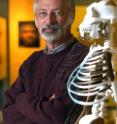'Ardi' research by Kent State's Lovejoy and colleagues named Science's 'Breakthrough of the Year'
Ardipithecus ramidus, or "Ardi," receives the top honor as the Breakthrough of the Year, named by Science and its publisher, AAAS, the world's largest science society. The Dec. 18 issue of Science (www.sciencemag.org) takes a look back at the big science stories over the past 12 months and presents its selections for the 10 major scientific breakthroughs of 2009. "Ardi," a hominid species that lived 4.4 million years ago, was unveiled on Oct. 1 by Kent State University Professor of Anthropology Dr. C. Owen Lovejoy and his colleagues. Their research findings on "Ardi" change the way we think of human evolution. An internationally recognized biological anthropologist who specializes in the study of human origins, Lovejoy was a part of an international research team that has spent that last several years studying "Ardi." Primarily, Lovejoy served as post-cranial anatomist and behavioral theorist. Research findings on "Ardi" were presented in 11 papers that appeared in the Oct. 2 issue of Science. Lovejoy was first author on five papers and contributed to an additional three.
"I, of course, think it's a great honor and entirely typical of all aspects of work going on at Kent State, especially in our growing number of flagship departments and schools," Lovejoy said regarding being a part of Science's 2009 Breakthrough of the Year.
Source: Kent State University
Articles on the same topic
- Science's breakthrough of the year: Uncovering 'Ardi'Thu, 17 Dec 2009, 19:49:38 UTC
Other sources
- Ardi named 'breakthrough' of 2009from CBC: Technology & ScienceThu, 17 Dec 2009, 23:07:08 UTC
- 'Ardi' research by Kent State's Lovejoy and colleagues named Science's 'Breakthrough of the Year'from Science BlogThu, 17 Dec 2009, 20:49:20 UTC
- Fossil find: breakthrough of 2009from BBC News: Science & NatureThu, 17 Dec 2009, 19:56:28 UTC
- Science's breakthrough of the year: Uncovering 'Ardi'from PhysorgThu, 17 Dec 2009, 19:42:41 UTC
